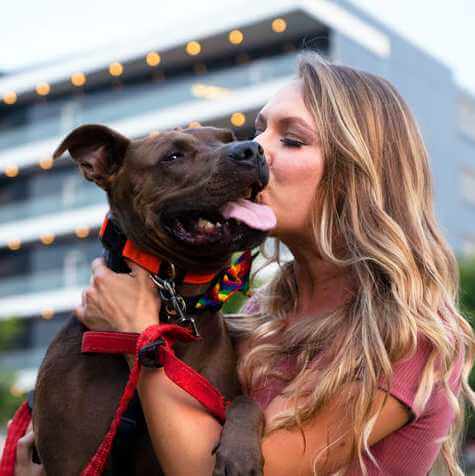Understand Your Dog Better
The day that someone breaks the language barrier between dogs and humans is going to be arguably the best day ever! (Paging Dr. Doolittle!)
Inviting these furry four-legged creatures of joy into our homes would go much more smoothly if we could speak their language. While that isn’t a possibility right now, there are some things we can do to better understand them, the way they think, and why they behave the way they do. In this blog, we’re going to look at a few of those ways so that you can gain a little more insight into your drooling, but adorable, roommate.
How smart is my dog?
A survey done by Tiffani Josey Howell found that 45.7% of people thought their dogs were the same intelligence level as a 3-5-year-old child. Only about 25% thought that dogs were smarter than a lot of people.
The problem is that we assume that dogs function on the same level of intelligence as us. When the reality is they are not.
Professor Maciej Henneberg, a professor of anthropological and comparative anatomy from the School of Medical Sciences, says that animals often possess different abilities that are misunderstood by humans. What this means is that dogs, just like humans, have different types of intelligence.
Some people tend to be more artistic while others tend to be better in mathematics while some might not do well in school but be great with technical knowledge. We are all different. Dogs are the same way. They may not be able to do complex mathematical equations (at least not that we know of) but they can locate a suspect from a two-day-old trail of scent! Their skills are different from ours and we really should not compare them to ourselves.
Professor Henneberg says “The fact that they may not understand us, while we do not understand them, does not mean our ‘intelligences’ are at different levels, they are just of different kinds. When a foreigner tries to communicate with us using an imperfect or broken version of our language, our impression is that they are not very intelligent. But the reality is quite different.”
So, your dog isn’t acting up because he is “stupid” or “unintelligent”. Read on to see what could be causing unwanted behaviors.
Is your dog bored?
Boredom and extra energy are the driving forces behind the most unwanted behavior.
Almost all of the annoying doggy behaviors are due to boredom. Dogs and puppies chew, dig up your yard, tear things up, bark, and tear things up because they are bored.
Changing the dog’s routine is important and easier than you think. Rotating toys and adding puzzles or other interactive toys into the mix are some easy ways to keep your dog guessing what’s next. Playing hide and seek, asking your dog to perform commands during walks, and allowing your dog to explore new places are only some of the ways to mentally stimulate your dog. Participating in activities such as agility, hunting, swimming, and playing fetch are other fun ways that you can interact with your dog on both physical and mental levels.

Is your dog under-stimulated?
Some dogs need a lot of mental stimulation during the day to help them stay out of trouble. Some breeds even more than others. A simple walk around the neighborhood might not be enough for them.
For example, when you take them on a walk, don’t always go on the same route. Also, allowing your dog to sniff a lot while they are on their walk and let them explore is very beneficial to them. The idea that your dog has to walk beside you on the walk is ridiculous. Especially when you think that the dog is actually wired to be out exploring the world around them. And they need that to function properly.
Change up the way you feed them. Sometimes you put the food in the bowl, but you make them sit and stay in someplace new. Sometimes you hide the bowl. Sometimes you put it in a food toy. Sometimes you ask them to sit and stay in one room and put the food in another room. Or maybe put a little bit of their food all over the house and make them go find it.
Does your dog know wrong from right?
Dogs are amoral. This means they are unaware or indifferent to questions of right or wrong.
We cannot say “My dog knew this was wrong! Why does he still do this?”
I am sorry, but your dog did not know this was wrong. He did know that it was safe for him to do that at the given moment.
Teri Pichot wrote in her book Animal-Assisted Brief Therapy that dogs are very in tune with us. They are able to read us like a book, but they are not able to make a moral judgment. She explains that dogs are able to think, but they are not able to think about their thinking. They cannot look back and think about why they did what they did.
When your dog steals food, it is not out of spite, it is simply they did it one time and now they know they can do it. We cannot get upset if it did not happen in front of us. That is the biggest mistake that we make, to expect the dog to think back to when he did the “wrong thing” and evaluate it. They know they did it, but are unable to make the connection between your current emotional state and their past behavior.
Final Thoughts
While I wish that I had the magical secret to communicating 100% of the time with our dogs, it’s just not a possibility. Because we’re human and we have the ability to empathize with other creatures (and because we’re the ones bringing them into our home), we need to show patience and compassion when getting to know our dogs. Take the time to do some additional research so that you have the best chances of understanding how your dog operates and how to bring out the best in their behaviors. This is what will create a harmony filled home.
Special Thanks To...

Jeff Tinsley is the owner of Sound Animals and Seattle’s most trusted dog behavior expert. He has been helping Seattle dog owners to solve their dog training and dog behavior problems for over 15 years. Recommended by veterinarians, rescue organizations, breeders, and other pet professionals, Sound Animals has all the dog classes and dog behavior training that you need.





